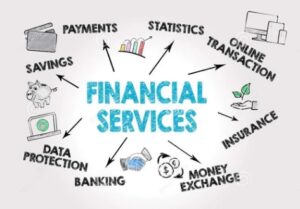The financial services industry includes enterprises that deal with money and play a crucial part in the global economy. The industry is extensive, with enterprises involved in operations. Before going to a bank or credit union, familiarize yourself with the services they provide, according to Joseph Stone Capital.
Reconciliation of Accounts
A checking account that allows you to make withdrawals and deposits. It’s perfect for paying bills and keeping track of your spending.

Accounts for Savings
A bank or other financial institution’s deposit account safeguards funds while simultaneously earning a small interest rate. Great for putting money aside in case of an emergency or for a short or medium-term goal.
Investing in Money Market Accounts
Low-transaction checking accounts with a higher minimum balance requirement in exchange for a higher interest rate are a way to build emergency funds or pay for one-time needs.
Deposit Certificates
Savings accounts that provide interest in return for committing your money for a specific length of time (six months, 12 months, etc.).
Mortgages
Loans for the purchase of a home with the residence as collateral
Loans against your home’s equity
Homeowner loans with a maximum loan amount based on a proportion of the home’s equity
Automobile Loans
Automobile loans are a type of loan used to fund the purchase of a vehicle. It is typically unsecured and is dependent on the borrower’s honesty and capacity to pay back the loan. The automobile is the collateral.
Loans for Individuals
Customers of banks get provided unsecured loans.
Using a Credit Card
Unsecured, revolving loans that come with a card and are typically used for purchases, though some offer cash advances as well. The credit card company establishes a maximum chargeable amount. Borrowers make monthly payments on both the amount charged to the account and the interest levied by the issuer. When charges get made, the funds are once again accessible for borrowing.

Debit Cards
Cards that allow point-of-sale transactions to get deducted from bank balances and ATM withdrawals are provided in conjunction with checking or savings accounts.
ATM Cards
Cards are offered in conjunction with checking or savings accounts that enable cash deposits and withdrawals at ATMs but not purchases at point-of-sale.
Cashier’s Checks
Bank checks that the bank customer has adequate cash to cover the cheque. The bank or credit union guarantees these checks. For example, closing fees in a property purchase may necessitate the cashier’s check.
Money Orders
Documents purchased with cash or written against other accounts that offer a receipt are converted to money by the receiver. When someone does not have a bank account, they frequently utilize this to pay expenses.
Traveler’s Checks
Checks drawn against an account or purchased with cash become legitimate when signed by the owner and include the payee’s name. It’s a term that’s becoming less popular these days.
Wire Transfers
It is a method of transferring money from one person to another, according to Joseph Stone Capital. It is frequently used to transmit money throughout the world.